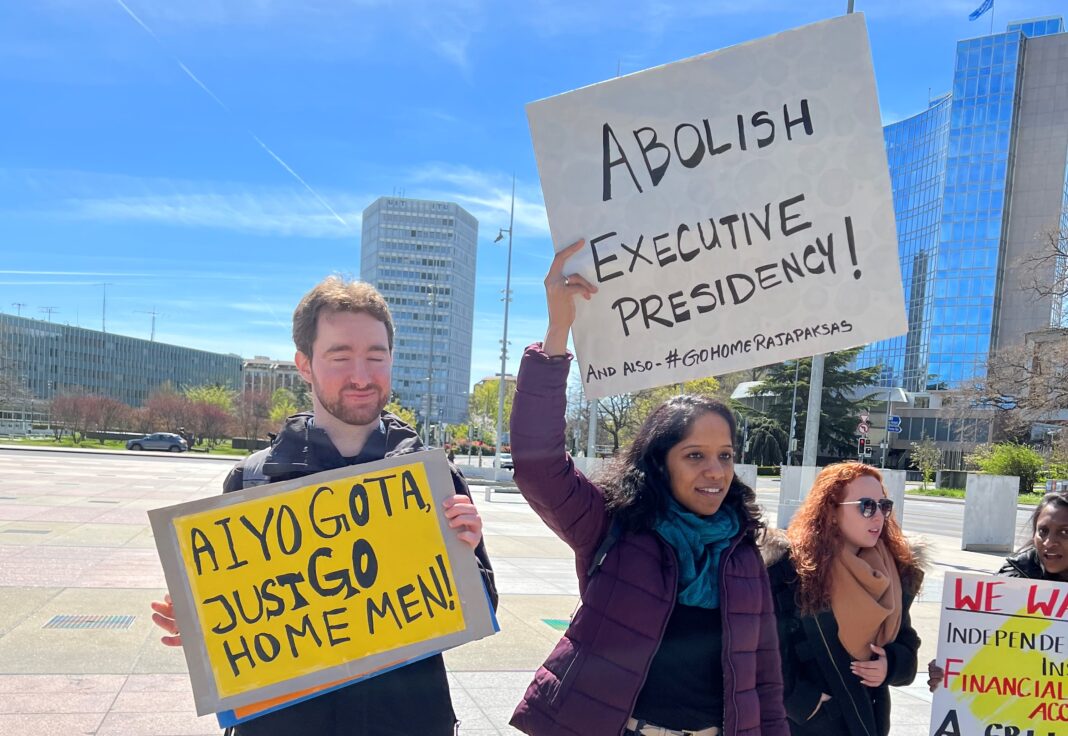We, the undersigned, recall that the demand for abolishing the executive presidency has a long history in Sri Lanka. All major political parties representing a broad cross-section of society have, over the years, called for such abolition. In fact, the people’s demand for the abolition of the executive presidency and the constitutional system built around it is as old as the present constitution itself. The current call for abolition is, therefore, not merely a reaction to the ongoing crises but a reiteration of the same demand witnessed ever since the promulgation of the present Sri Lankan Constitution.
Even prior to the formal introduction of the Constitution in 1978, parties in the Opposition, including the Sri Lanka Freedom Party (SLFP) and several Left-oriented parties, including the Janatha Vimukthi Peramuna (JVP), vehemently opposed the proposal to establish the executive presidency.
Beginning with the 1994 presidential election, presidential candidates have repeatedly pledged to abolish this system. President Chandrika Bandaranaike Kumaratunga vowed to abolish the executive presidency and received a clear mandate to do so both in 1994 and 1999. In 2000, the proposed Bill for a new constitution was poised to abolish the executive presidency but was eventually rejected by the United National Party (UNP) led by current President Ranil Wickremesinghe. In fact, the UNP’s grievance with respect to the Bill did not concern the abolition of the presidency but related to the transitional period in which the then-President Kumaratunga would continue to hold office.
The UNP also affirmed its commitment to abolish the executive presidency at its Hambantota conference in 2010. At times, former President Mahinda Rajapaksa also talked about the need to abolish the executive presidency.
The promise to abolish the executive presidency was one of the central election pledges of President Maithripala Sirisena in 2015. The Nineteenth Amendment to the Constitution, which reduced the powers of the executive president, was the first step taken by the Sirisena-Wickremesinghe coalition government to work towards the abolition of the executive presidency.
The political representatives of all ethnic and religious communities, including the Tamil, Muslim and Malaiyaha Tamil communities, have supported the reform agenda for abolition. Most notably, all communities participated in and supported the reform process undertaken from 2015 to 2019, which featured a Constitutional Assembly and culminated in a Steering Committee Interim Report that recommended the abolition of the executive presidency.
More recently, both the JVP in 2019 and the Samagi Jana Balavegaya (SJB) in 2022 tabled constitutional amendments in Parliament to abolish the executive presidency.
Therefore, it is clear that every single major political party and political leader in active politics has, at some point or another, endorsed the people’s demand to abolish the executive presidency. Today, only a few political leaders appear to oppose its abolition purely due to their ambitions to capture the executive presidency for themselves.
Over the past four and a half decades, the people of Sri Lanka and their political representatives have come to the correct understanding that the executive presidency has been abused by successive occupants of that office to the detriment of the people. It has continued to remain an abhorrent feature of Sri Lanka’s constitutional framework. It is the general belief among the people that the executive presidency, with its excessive powers concentrated in the hands of one individual, has been singularly responsible for weakening Sri Lanka’s democracy. It has also been the cornerstone of the system of arbitrary executive governance imposed on the Sri Lankan people. The multiple crises that have presently befallen the country and the continuing erosion of the framework of democratic governance are a stark reminder of the dire consequences of this wholly negative feature of our constitution. Its abolition has been delayed far too long.
We also wish to emphasize that any attempt at abolishing the executive presidency should not be tied up with the partisan and immediate interests of any political party, coalition or individual. We stress that this genuinely democratic demand of the people should not be used as a tool of political manipulation either. Rather, it should be an integral component of an agenda for far-reaching political reforms, reflecting the people’s desire for accountable government and for re-democratising Sri Lanka’s state, constitution, and government.
It is in this context that we, the undersigned, call upon the Government of Sri Lanka and Parliament to immediately launch a meaningful and sincere process to abolish the executive presidency as part of a package of democratising reforms. We also call upon all political parties in parliament to sponsor and vote for such a Bill and to unveil to the citizens their overall agenda with a time frame for restoring democratic government in Sri Lanka. Indeed, the Sri Lankan people’s call for ‘system change’ requires the abolition of the executive presidential system and fresh parliamentary elections. The message has never been clearer. Its fulfilment should not be blemished by the tactics and manipulatory schemes of those in power.
ENDORSED BY:
Hilmy Ahamed
Silma Ahamed
Geoffrey Alagaratnam, President’s Counsel
Dr. Vinya Ariyaratne
Professor Navaratna Banndara
Dr Lionel Bopage, President of the Australian Advocacy for Good Governance in Sri Lanka Inc.
Hans Billimoria – The Grassrooted Trust
K. J. Brito Fernando, Families Of the Disappeared
Anushya Coomaraswamy
Centre for Policy Alternatives
Sarala Emmanuel
Duleep de Chickera, former Bishop, Anglican Church of SL.
Suren Fernando (Attorneys at law)
Inshira Faliq, (Attorney at Law)
Bhavani Fonseka
Rosanna Flamer-Caldera, EXECUTIVE DIRECTOR, Pronoun: She/Her
Dr. Rajni Gamage
Dr Mario Gomez, International Centre for Ethnic Studies (ICES)
Sharmaine Gunaratne, (Attorney at law)
Bishop Kumara Illangasinghe
Jayanthi Kuru-Utumpala, women’s rights activist’
Dr. Devanesan Nesiah
Professor Vasuki Nesiah
Professor Gameela Samarasinghe
Dr P. Saravanamuttu,
Dr Kalana Senaratne
M A Sumanthiran, President’s Counsel
Mahendran Thiruvarangan, Academic, University of Jaffna
Professor Deepika Udagama
Professor Jayadeva Uyangoda
Dr Jayampathy Wickramaratne, President’s Counsel
Lal Wijenayake (Attorney at Law)
